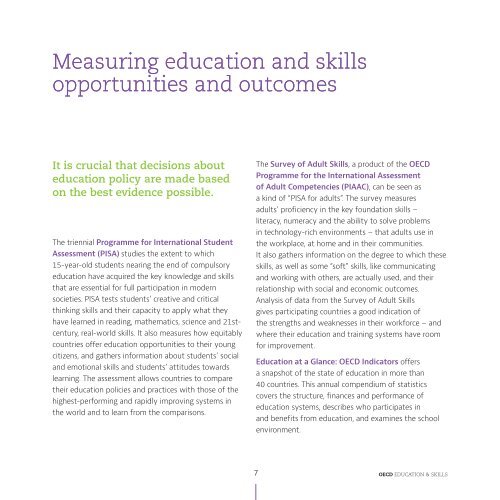Directorate-for-education-and-skills-brochure.pdf?utm_content=bufferf4a33&utm_medium=social&utm_source=twitter
Directorate-for-education-and-skills-brochure.pdf?utm_content=bufferf4a33&utm_medium=social&utm_source=twitter
Directorate-for-education-and-skills-brochure.pdf?utm_content=bufferf4a33&utm_medium=social&utm_source=twitter
You also want an ePaper? Increase the reach of your titles
YUMPU automatically turns print PDFs into web optimized ePapers that Google loves.
Measuring <strong>education</strong> <strong>and</strong> <strong>skills</strong>opportunities <strong>and</strong> outcomesIt is crucial that decisions about<strong>education</strong> policy are made basedon the best evidence possible.The triennial Programme <strong>for</strong> International StudentAssessment (PISA) studies the extent to which15-year-old students nearing the end of compulsory<strong>education</strong> have acquired the key knowledge <strong>and</strong> <strong>skills</strong>that are essential <strong>for</strong> full participation in modernsocieties. PISA tests students’ creative <strong>and</strong> criticalthinking <strong>skills</strong> <strong>and</strong> their capacity to apply what theyhave learned in reading, mathematics, science <strong>and</strong> 21stcentury,real-world <strong>skills</strong>. It also measures how equitablycountries offer <strong>education</strong> opportunities to their youngcitizens, <strong>and</strong> gathers in<strong>for</strong>mation about students’ social<strong>and</strong> emotional <strong>skills</strong> <strong>and</strong> students’ attitudes towardslearning. The assessment allows countries to comparetheir <strong>education</strong> policies <strong>and</strong> practices with those of thehighest-per<strong>for</strong>ming <strong>and</strong> rapidly improving systems inthe world <strong>and</strong> to learn from the comparisons.The Survey of Adult Skills, a product of the OECDProgramme <strong>for</strong> the International Assessmentof Adult Competencies (PIAAC), can be seen asa kind of “PISA <strong>for</strong> adults”. The survey measuresadults’ proficiency in the key foundation <strong>skills</strong> –literacy, numeracy <strong>and</strong> the ability to solve problemsin technology-rich environments – that adults use inthe workplace, at home <strong>and</strong> in their communities.It also gathers in<strong>for</strong>mation on the degree to which these<strong>skills</strong>, as well as some “soft” <strong>skills</strong>, like communicating<strong>and</strong> working with others, are actually used, <strong>and</strong> theirrelationship with social <strong>and</strong> economic outcomes.Analysis of data from the Survey of Adult Skillsgives participating countries a good indication ofthe strengths <strong>and</strong> weaknesses in their work<strong>for</strong>ce – <strong>and</strong>where their <strong>education</strong> <strong>and</strong> training systems have room<strong>for</strong> improvement.Education at a Glance: OECD Indicators offersa snapshot of the state of <strong>education</strong> in more than40 countries. This annual compendium of statisticscovers the structure, finances <strong>and</strong> per<strong>for</strong>mance of<strong>education</strong> systems, describes who participates in<strong>and</strong> benefits from <strong>education</strong>, <strong>and</strong> examines the schoolenvironment.7OECD EDUCATION & SKILLS


